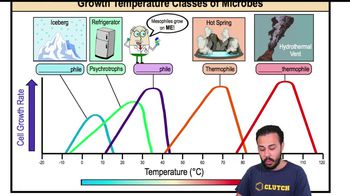Seven methods of measuring microbial growth were explained in this chapter. Categorize each as either a direct or an indirect method.
Which one of the following temperatures would most likely kill a mesophile?
a. -50℃
b. 0℃
c. 9℃
d. 37℃
e. 60℃
 Verified step by step guidance
Verified step by step guidance
Verified Solution
Key Concepts
Mesophiles

Thermal Death Point

Temperature Effects on Microbial Growth

By deep-freezing, bacteria can be stored without harm for extended periods. Why do refrigeration and freezing preserve foods?
Nitrogen and phosphorus added to beaches following an oil spill encourage the growth of natural oil-degrading bacteria. Explain why the bacteria do not grow if nitrogen and phosphorus are not added.
Differentiate complex and chemically defined media.
Which of the following is true about the optimum growth temperature of most mesophiles?
a) They can grow well at 37^0C.
b) They are more likely to grow at refrigerator temperatures.
c) They can strive well in extremely high temperatures.
d) All of the above.
Which of the following types of media would not be used to culture aerobes?
a. selective media
b. reducing media
c. enrichment media
d. differential media
e. complex media
